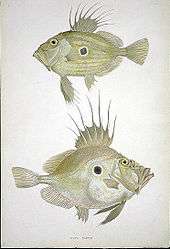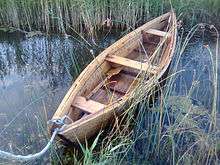Definify.com
Webster 1913 Edition
Dory
Do′ry
,Noun.
pl.
Dories
(#)
. Do′ry
,Noun.
pl.
Dories
. A small, strong, flat-bottomed rowboat, with sharp prow and flaring sides.
Definition 2026
dory
dory
English
Pronunciation
- Rhymes: -ɔːri
Noun
dory (plural dories)
- (nautical) A small flat-bottomed boat with pointed or somewhat pointed ends, used for fishing both offshore and on rivers.
- 1897, Rudyard Kipling, Captains Courageous:
- From every schooner, dories were being dropped into the shining, clear water. The sound of voices and the splashes of oars carried across the sea.
- 1907, Robert W[illiam] Chambers, “chapter IX”, in The Younger Set (Project Gutenberg; EBook #14852), New York, N.Y.: A. L. Burt Company, published 1 February 2005 (Project Gutenberg version), OCLC 4241346:
- He and Gerald usually challenged the rollers in a sponson canoe when Gerald was there for the weekend; or, when Lansing came down, the two took long swims seaward or cruised about in Gerald's dory, clad in their swimming-suits; and Selwyn's youth became renewed in a manner almost ridiculous […]
- 1960 February, John Gardner, “The Remarkable Dory: This Boat has Served Sailormen Well, and Many of Today's Able Pleasurecraft are Direct Descendants of the Line”, in Popular Boating, volume 7, number 2, OCLC 8028046, page 90:
- The dory, and the fisherman who rowed it, are part of the maritime heritage that changed America from a group of shore-bound colonies to a nation with ships that ranged the waters of the world.
- 1978 March, Steven H. Rubin, “The St. Pierre Dory: An Endangered Species”, in Boating, volume 43, number 3, ISSN 0006-5374, page 72:
- It is almost impossible for anyone who loves boats not to rejoice at the sight of a St. Pierre dory. Gaily painted, with lots of sheer and a defiantly jaunty look to them, the dories have been pleasing the eyes of their beholders for nearly a century.
- 2008, Jeanna Rosembalm Bottenberg, The Dory Fleet of Pacific City, Charleston, S.C.: Arcadia Publishing, ISBN 978-0-7385-5813-4, page 41:
- A dory, by definition, is a flat-bottomed boat with two pointed (or nearly pointed) ends. The traditional dories of the Pacific City fleet were just that. Over the years, however, they have evolved into the square-stern variety seen today.
- 2013 November 27, John Grotzinger, “The world of Mars [print version: International Herald Tribune Magazine, 2013, p. 36]”, in The New York Times:
- John Wesley Powell ... the one-armed Civil War veteran led nine men in four wooden dories down the untamed and uncharted Colorado River and into the equally untamed and uncharted Grand Canyon.
-
Translations
type of boat
|
|
Etymology 2

An 1831–1841 pencil and watercolor illustration of the John Dory (Zeus faber) by William MacGillivray, from the collection of the Natural History Museum, London
From Old French doree, past participle of dorer (“to gild”), from Latin deauratus.
Pronunciation
- Rhymes: -ɔːɹi
Noun
dory (plural dories)
- Any of several different families of large-eyed, silvery, deep-bodied, laterally compressed, and roughly discoid marine fish.
- 1800, “Copy of an Original Manuscript, Entitled, 'A Breviate Touching the Order and Governmente of a Nobleman's House', &c. Communicated by the Right Hon. Sir Joseph Banks, Bart. K.B. P.R.S. and F.S.A.”, in Archaeologia: Or, Miscellaneous Tracts Relating to Antiquity, volume XIII, London: Society of Antiquaries of London, OCLC 18424146, page 353:
- A DIATREE FOR DINNER. […] The ſeconde Courſe. […] Dorye
- 2012, Shirley Cameron, Cooking the Australian Way, 8th edition, South Yarra, Vic.: Macmillan Education Australia, ISBN 978-1-4586-9588-8, page 265:
- Pan-fried fish. Barramundi, bream, flounder, garfish, John Dory, snapper and Silver Dory are suitable for this recipe.
- 2012, Martin Hannan, Harvey Wallbangers and Tam O'Shanters: A Book of Eponyms – The People Who Inspired the Words We Use Every Day, London: John Blake Publishing, ISBN 978-1-84358-869-6:
- The golden skin of the fish found mostly in the Mediterranean may account for one possible reason why it is called ‘John Dory’, since the French word for yellow is ‘jaune’ and for golden is ‘dorée’.
-
- (obscure, cooking) A dish that has been coated or glazed with a yellow substance or with "almond milk".
Translations
type of fish
|
Adjective
dory (comparative more dory, superlative most dory)
- (obscure) Of a bright yellow or golden color.
- 1962 (quoting c. 1398 text), Hans Kurath & Sherman M. Kuhn, editors, Middle English Dictionary, Ann Arbor, Mich.: University of Michigan Press, ISBN 978-0-472-01044-8, page 1242:
- (obscure, cooking) Coated or glazed with a yellow substance or with "almond milk".
- c. 1430 (reprinted 1888), Thomas Austin, editor, Two Fifteenth-century Cookery-books. Harleian ms. 279 (ab. 1430), & Harl. ms. 4016 (ab. 1450), with Extracts from Ashmole ms. 1429, Laud ms. 553, & Douce ms. 55 (Early English Text Society, Original Series; 91), volume I, London: N. Trübner & Co. for the Early English Text Society, OCLC 374760, page 11:
- Soupes dorye. — Take gode almaunde mylke […] caste þher-to Safroun an Salt […] Soupes dorroy […] Do þe dorry a-bowte.
- 1962 (quoting 1381 text), Hans Kurath & Sherman M. Kuhn, editors, Middle English Dictionary, Ann Arbor, Mich.: University of Michigan Press, ISBN 978-0-472-01044-8, page 1242:
- dorrẹ̅, dōrī adj. & n. […] cook. glazed with a yellow substance; pome(s ~, sopes ~. […] 1381 Pegge Cook. Recipes p. 114: For to make Soupys dorry. Nym onyons […] Nym wyn […] toste wyte bred and do yt in dischis, and god Almande mylk.
- c. 1430 (reprinted 1888), Thomas Austin, editor, Two Fifteenth-century Cookery-books. Harleian ms. 279 (ab. 1430), & Harl. ms. 4016 (ab. 1450), with Extracts from Ashmole ms. 1429, Laud ms. 553, & Douce ms. 55 (Early English Text Society, Original Series; 91), volume I, London: N. Trübner & Co. for the Early English Text Society, OCLC 374760, page 11:
Etymology 3
Borrowing from Ancient Greek δόρυ (dóru).
Alternative forms
Pronunciation
IPA(key): /dɒrʊ/
Noun
dory (plural dories)
- A wooden pike or spear about three metres (ten feet) in length with a flat, leaf-shaped iron spearhead and a bronze butt-spike (called a sauroter), which was the main weapon of hoplites in Ancient Greece. It was usually not thrown but rather thrust at opponents with one hand.
- 1990, Richard A. Gabriel, The Culture of War: Invention and Early Development [Contributions in Military Studies; 96], New York, N.Y.: Greenwood Press, ISBN 978-0-313-26664-5, page 89:
- The basic weapon of the hoplite was the dory, a wooden-shaft spear six to nine feet long with a metal point at each end.
- 2000, Nick Sekunda, Greek Hoplite: 480–323 BC [Osprey Military, Warrior Series; 27], Oxford: Osprey Publishing, ISBN 978-1-85532-867-9, page 12:
- The principal offensive weapon of the hoplite was his spear (dory). Conquered territory was said to be 'spear-won'.
- 2011 (republished 2014 as an e-book), Chris McNab, A History of the World in 100 Weapons, Oxford: Osprey Publishing, ISBN 978-1-4728-0832-5, page 37:
- The principal weapon of the hoplite was the dory spear. It was unusually long – it could measure up to 10ft (3m) in length, and weighed about 4.4lb (2kg). At one end was a broad, leaf-pattern spearhead, while at the other end was a metal spike called a sauroter. The purpose of the spike is much debated: it almost certainly acted as a counterbalance, making the spear easier to hold and wield; it could have been used as an improvised spear point, or for making downward attacks on the enemy's exposed feet; or it might even have been embedded in the ground to keep the spear in place.
- 2012, Fred Eugene Ray, Jr., Greek and Macedonian Land Battles of the 4th Century B.C.: A History and Analysis of 187 Engagements, Jefferson, N.C.: McFarland & Company, ISBN 978-1-4766-0006-2, page 90:
- Sadly, the Greeks' weapons have succumbed to erosion; yet all are single-handed and one figure is striking overhead with left leg forward consistent with the use of a dory.
-
References
- “dory” in Douglas Harper, Online Etymology Dictionary (2001).
